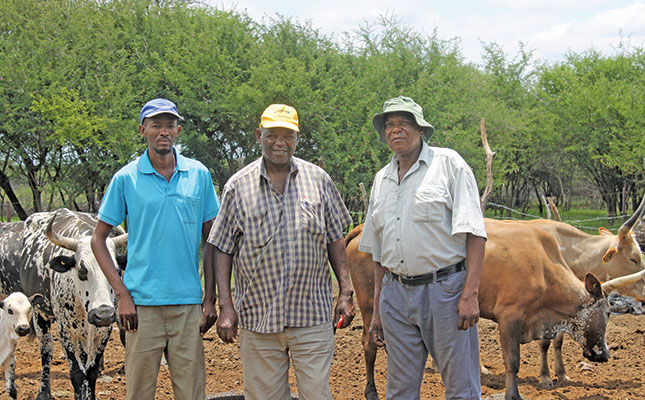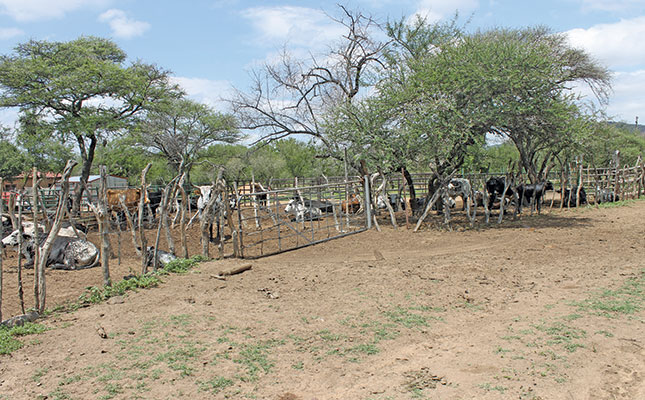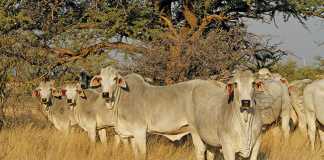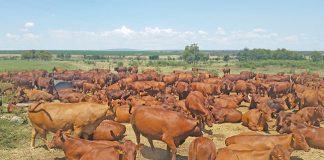
Photo: Siyanda Sishuba
Piet Phahlane, along with his son, Richard, and Aaron Makena and his sister-in-law, Elizabeth, are business partners of a livestock farming operation on Melkhoutfontein in Rust de Winter near Bela-Bela in Limpopo. They farm cattle, goats and sheep.
The operation was started in 1992 by Phahlane, Makena and his brother, Piet, who has since died and whose share in the business was taken over by his wife, Elizabeth.
They began by leasing the land from the then Department of Land Affairs, and now lease it from the newly established Department of Agriculture, Land Reform and Rural Development.

From the start, their lease agreement has been precarious. Initially, they were able to obtain an agreement for only one year at a time. In 2014, this was extended to three years.
According to Phahlane, they have requested a longer lease duration from the department.
“Uncertainty regarding a long-term lease agreement is a detrimental factor to the business as this prevents us from making any investments on the farm as we grow,” he explains.
They have suffered many losses, especially of small stock, due to predation and stock theft. If they could get a longer lease agreement, they would be able to start investing in proper fencing to better protect their animals, he says.
Cattle breeding
The duties of running and managing the farm are shared among the group, but they are still in the process of better defining each person’s role as they formalise their business structure.
However, says Phahlane, planning ahead is vital as it ensures that day-today operations run smoothly. To this end, meetings are held on a weekly basis.
When they first started farming, their commercial herd consisted of mixed-breed cattle, but they later started focusing on Bonsmara and Nguni genetics. Makena says they chose the Bonsmara because of its high-quality beef and its resistance to local diseases.
In 2015, they received 30 in-calf Nguni heifers and one bull from the Gauteng Department of Agriculture and Rural Development as part of its Nguni Cattle Breeding Project. Run in partnership with the Industrial Development Corporation, the project is aimed at helping emerging black farmers and focuses on breeding.
After a period of five years, participating farmers are expected to return the same number of cattle, their offspring, or an equivalent rand value. The main objectives of the project are to reintroduce the Nguni breed of cattle into the province in large numbers and teach emerging farmers livestock farming and entrepreneurship skills.
Today, Phahlane and his family’s commercial herd consists of 101 cattle. The animals are
kept in seven camps, roughly equal in size, on two farms, one of 750ha and the other of 850ha.
Smaller camps are used to separate bulls, heifers, breeding heifers and weaners as needed, but groups of animals graze on veld together in larger camps during the day.
Water is provided from three boreholes. The cattle graze for three months at a time on a rotational basis and all animals have access to supplementary winter and summer licks.
“During the drought, we also bought in bales and other feed, but this became very expensive, very quickly,” Makena says.
Calves are weaned at six to seven months, depending on the quality of grazing available, and are then sold at auction to feedlots or directly to abattoirs. The farm produces about 60 weaners a year.
Bulls selected to be retained in the herd for breeding, based on the selection and performance records of their parents, are kept in the herd for three years before being sold.
Young heifers are given two opportunities to conceive, after which they are culled. The pair use natural mating and the breeding season runs from January to May. For recording purposes, calves are weighed at birth, and again at weaning.
At seven months, the calves achieve an average weaning weight of between 175kg and 180kg.
Herd health
“Keeping records assists us with disease management. We conduct daily observations for early disease detection, and keep a meticulous daily record of each cow’s health and information such as disease occurrence and date, all veterinary care to cure diseases, vaccination, dipping and treatment,” says Phahlane.
Keeping track of disease occurrences and treatment helps highlight repeated problems,
events and vulnerable groups of animals over time, and builds up a detailed picture of the health status of each animal and hence the entire herd.
This leads to better management and helps ensure important vaccinations are administered at the right time.
“As a result, our mortality due to diseases has decreased over the years. We didn’t have any mortalities last year,” says Phahlane.
The team works closely with state veterinarians to implement an animal health management strategy on the farm. Major problem diseases in this area include heartwater, lumpy skin disease and brucellosis, which they manage by following a vaccination programme.
“We attend the Agricultural Research Council’s National Beef Recording and Improvement
scheme study group on a monthly basis. The study groups are helpful and we’ve learnt many management skills from them that have helped us improve the productivity of
our animals,” says Phahlane.
Planning for the future
As a solution to their short-term lease problem, the agriculture department has encouraged
them and other farmers in the surrounding areas to register their farming businesses as
co-operatives for a possible lease agreement of 30 years.
The thinking behind this is that the department believes this type of business structure will encourage farmers to make provision for succession plans. Phahlane says government is
concerned about farms being left fallow for years when the owners have grown old and can no longer farm.
Bringing his son, Richard, into the business signifies the start of their succession plan, says Phahlane, and they are working on ensuring that other young family members interested in agriculture will also be brought on board and taught the necessary skills.
“Teaching them the skills is important. It’s pointless to give a farm to your children just because they are your children. All your hard work may be wasted,” he says.
Phone Piet Phahlane on 073 155 1420 and Aaron Makena on 083 992 3416











